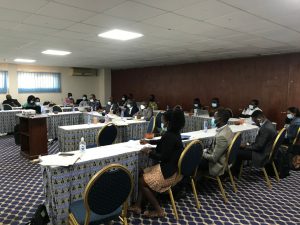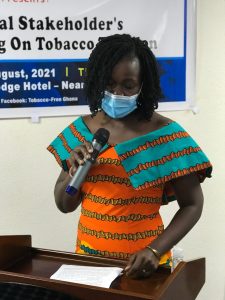
A national stakeholders meeting on tobacco taxation has been held in Accra. The meeting organized by the Vision for Alternative Development (VALD) and the Tax Advocacy Network for Health Promotion brought together civil society organizations working on tobacco control in Ghana, tax experts, officials from the Customs Division of the Ghana Revenue Authority (GRA), the Food and Drugs Authority (FDA), Ministry of Finance, Ministry of Health, Academics, the Media Alliance in Tobacco Control and Health (MATCOH), among others.
Participants dialogued on tobacco control and tobacco taxation with reference to the World Health Organization Framework Convention on Tobacco Control (WHO FCTC) and how to get the buy-in of policy makers and all relevant stakeholders.
The meeting forms part of the Tax Justice Network Africa (TJNA) Project currently being implemented by VALD and its partners.
The tax project aims to ensure that policymakers and advocates understand the potential role of tobacco taxes in reducing tobacco use, improving health outcomes, and mobilizing adequate domestic resources within the broader lens of tax justice – in the context of tobacco taxation and how it can contribute significantly to national development.

VALD and its partners have therefore urged the government to consider changing the tobacco tax administration regime in Ghana to serve the country’s public health interest in line with Act 851 and the WHO FCTC Article 6.
The Director of Programs at VALD, Labram Musah, who is also the Coordinator for the project said among others that the project will strengthen relationships and partnerships with government and other key stakeholders towards a whole-society response to tobacco control.
It is also to ensure that the “Affordability of tobacco is reduced in Ghana; the development of a broader tax and economic justice community in Ghana supportive of tobacco taxation; and reduce tobacco industry’s influence in the development and implementation of tobacco tax policies.”
Executive Director of VALD, Issah Ali, lamented the fact that Ghana has not taken advantage of the enormous benefits tobacco taxation brings to a country. According to him, the most recent tax increment announced on tobacco products in Ghana was in 2014.
“This and other factors continue to make tobacco products very cheap on the market. These make the tobacco industry happy since their product will continue to be very cheap and affordable to children, the poor and vulnerable,” he stated, adding that “Act 851 (Public Health Act) bans the sale of cigarettes in single sticks with the aim of making tobacco less affordable but these are violated.”
A Senior Regulatory Officer in charge of Tobacco and Substance Abuse at the Food and Drugs Authority (FDA), Mavis Danso, while pledging the Authority’s support for the project noted among others that tobacco use remains one of the leading preventable causes of Non-Communicable Diseases (NCDs) and death with an annual deaths toll of 4 million people worldwide. She said half of these deaths occur in developing countries.
“One of the most effective policies for reducing tobacco use to increase the price of tobacco products, which is most commonly achieved, is by increasing taxes. Raising taxes on tobacco is enough to increase tobacco prices to make them more expensive. As with many consumer products as demand decreases supply automatically increases,” she stated.

She said tobacco taxation, passed on to consumers in the form of higher cigarette prices, has been recognized as one of the most effective population-based strategies for decreasing smoking and its adverse health consequences, and that per the WHO report on the Global Tobacco epidemic in 2008, on an average, a price increase of about 10% will decrease the demand of tobacco by 4% in high income countries.
“The advocacy and fight to increase taxes and change the tax regime on tobacco and tobacco products is a loudable one and as such support is needed to achieve one of the most important strategies in the fight against this global tobacco menace. The FDA pledges its support and commitment in this regard to ensure public health and safety.”
Special advisor to the Minister of Health, Dr. Barfuor Awuah, who represented the Minister at the meeting said the Ministry has tasked itself to strengthen health policies relating to tobacco control to ensure that they are included on key policy agenda of the government.
“We have thus in collaboration with our Agencies and partners launched the Smoking Cessation Clinical Guidelines for Ghana and Tobacco Control Regulations, LI 2247 for tobacco control in Ghana in 2017. We have also put in place adequate monitoring system and institutional arrangements (i.e. the National Tobacco Control Programme under the Ghana Health Service) to monitor the process of these guidelines and regulations for better health outcomes.”

Representatives of the Customs Division of the Ghana Revenue Authority (GRA), led by Nelson Bright Atsu, and the Ministry of Finance, in their separate presentations made firm commitments in favor of the project as they highlight its advantages. They expressed their readiness to partner VALD and the Tax Advocacy Network in a collaboration that is expected to inure to public health.
Labram Musah told ghananewsonline.com.gh in an interview on the sidelines of the meeting that they expect the project to bring Tax policy reform – Shift from the tiered tobacco excise tax system to a uniform specific excise tax system; as well as ensure Tax increase – by at least 15% in nominal terms. It is also their expectation that the project will lead to Ghana ratifying the Illicit Trade Protocol on Tobacco Products (ITP) and ensure its domestication and implementation.
By Jeorge Wilson Kingson || ghananewsonline.com.gh

